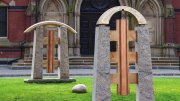Murray Dewart ’70, a Boston-raised sculptor, was born into a family of three generations of clergymen but always knew he wanted to be an artist. It wasn’t until he found the Carpenter Center for the Visual Arts during his junior year at Harvard and threw himself into the art form that Dewart—who originally thought he was going to be a novelist—knew this was his calling. He recalls the janitor kicking him out most subsequent nights. Recently, after more than 40 years as a professional sculptor with more than 200 group exhibitions in the United States, China, France, and Peru, Dewart—at 75 years old—got the time to reflect on his lengthy career as an artist ahead of the publication of his 2023 memoir, Hammer and Tongs: Journal of an Artist and Sculptor.
“When you make a sculpture, it’s about sharing something,” he says. “I want my work to be universal.”
Part of Dewart’s journey of reflection was returning to Harvard in June 2022 to organize a memorial service for deceased class members, a multi-media cabaret, and an “Arts in Our Lives” symposium ahead of the Class of 1970 reunion weekend, which had been delayed because of the pandemic. After one of the keynote speakers of the reunion pulled out at the last minute, Dewart stepped in to deliver the symposium’s address where he poked fun at his own artistic journey as a student.
“Announcing my career plan to my father and grandfather at graduation, I noticed they could not hide their disappointment,” he said. “Have you thought about medical school, Mac? They tried to talk me out of it.”
Fifty years later, Dewart feels there is no greater honor than joining the tradition of making art and says, “Art is born of a lonely impulse, pulling something out of the silence, out of the blank page, but the artists of the past keep us company.”
Dewart has completed large-scale public commissions in China and Israel, and in 2013, Sculpture Magazine called him one of Boston’s premier sculptors. His work—which is characterized by its bronze and granite materials, often resembling gates—even stands in the courtyard of Leverett House. Most recently, his four-piece set, “The Temple of the Late Flower,” was on display on the north end of Memorial Hall. The title was inspired by Cabot professor of aesthetics and the general theory of value Elaine Scarry’s writings about moral generosity.
“The moral generosity of people is sometimes called the late flower of civilization,” he paraphrases. “And when you’re 75, you’re always ‘late in the day.’”
Dewart recognizes the beauty in the risk required and the creativity that comes with being an artist. He starts every day with a literal blank page, where he writes what comes to him. He remains an artist, and age puts no limit on what he will do next. Above all, what remains at the center of his work is using his imagination to create works that connect with people.
“Imagination is linked to compassion,” he says.









